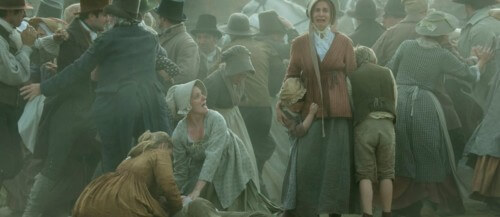
Peterloo (2018)
Director: Mike Leigh
Screenwriter: Mike Leigh
Starring: Rory Kinnear, Maxine Peake, Pearce Quigley, David Moorst, Rachel Finnegan, Tom Meredith, Simona Bitmate, Robert Wilfort, John-Paul Hurley, Victor McGuire
Veteran British director Mike Leigh returns with a new, big budget historical drama about the massacre of St. Peter’s Field, Manchester, where in the summer of 1819 a large number of defenceless working class people gathered to demand parliamentary reform and were consequently injured and murdered by armed, horse-bound government malitias in an act that would come to play a significant role in the formation of the Great Reform Act some 13 years later; an act that sought to offer greater coverage of voting rights (particularly towards large cities like Manchester) and granted 1 in 5 British males the privilege to vote.
Leigh’s wordy historical piece was presented with an unflinching authenticity in almost every aspect, from its cast’s coloured teeth to the historical dialect of the people of Greater Manchester at the time, and successfully went about using said language as a means of distinguishing differing agendas and most notably class divides between its many, many characters. Where the working class may have seemed identifiable and understandable, the upper classes were almost indistinguishable from one another, a part of the presentation that worked to create a firm and authoritative stance from Leigh as the film’s visionary, but bogged the picture down in boring albeit grandiose and pompous language that not only served the purpose of Leigh’s opposing stance on the subject but also served served boredom in the bucket load.
By the same token, large portions of the movie faded away into meaningless drivel as Leigh developed stories around characters who may have been historically significant but held little to no value towards the narrative and served only to prolong a run-time that was at least 30 minutes beyond its means; an aspect of the production that washed a great Maxine Peake performance into the same mixing pool as that of quite literally dozens of other performers, each recognisable names in their own right. There was truly little to no reason to care about said characters, nor the chance to come to understand their meaning to the plot other than for Leigh to honour or shame them, a history book seemingly firmly rooted in the filmmaker’s right hand.
As a result, the picture came across as unfocused, though it truly wasn’t. The intention of Leigh and company was to create a strong sense of understanding of the context and significance of the massacre that would come to be known as Peterloo, and the filmmakers succeeded in strongly connecting the issues of the day to those of life in the UK in the present, some 200 years later. But, with so many characters and story threads, including some that arose and then died in what came to be an overly long 2nd act, Peterloo felt like a movie re-telling history for those interested in its cause instead of the big-budget, moving drama that many had come to expect. It may not have been unfocused, but it certainly lacked the means to maintain attention in its dozens of wordy scenes of exposition, and truly came across like a filmmaker quite directly addressing the audience with “this is something you should know, let me help you to understand it.”
A consequence of Leigh’s laboured build and plot development was the sheer brutality, drama and sentiment of the picture’s conclusive massacre however, a masterpiece of a sequence that unrelentingly sliced through everything Leigh had built to leave the cast decimated, and the point of the entire piece well and truly delivered. It was a sequence that took the breath away and maintained its stranglehold for what seemed like 10 minutes or so, the brutal and unjust murders of the masses pressed into your senses in a way that made the history-making act of violence entirely unforgettable and your position as a viewer completely in line with those Leigh looked to champion.
If Ken Loach’s I, Daniel Blake was “our quiet rage”, then Peterloo was our very real, contemporary fears; the film acting as a stark reminder of the entitlement of privilege and the undying fight against it. This may not have been the watchable, fanciful fair that had come to be expected from a famously independent filmmaker who had been given his biggest production budget ever but, as was the case with the director’s previous release Mr. Turner, this movie was beautiful in places, truly like something out of a renaissance painting. Even so, Peterloo lacked the specificity and emotion (from the first minute to the last) of a fellow northern, working class championing picture like an I, Daniel Blake, with its insistent history lesson coming to derogatorily land it in the realm of “made for TV movie” despite its clear artistic merits in terms of visuals at the very least.
This was by no means a bad picture, and it will almost certainly be the subject of many a think piece and academic paper for years to come, whether it be for its layered approach to a historically significant moment or the way the movie can be seen as an allegory for filmmaking itself (the massacre being the act of editor to the writer-director’s vision), but it was a film that overstayed its welcome and unfortunately came across as patronising in parts and completely disconnected in others. Mike Leigh has made better films, and though this may go down as one of his most significant in terms of the director as a potential auteur, Peterloo as a standalone project was merely reminiscent of something great rather than something great in of itself, like the best History Channel docu-drama you’ve ever seen.
15/24
[DISPLAY_ULTIMATE_SOCIAL_ICONS]

